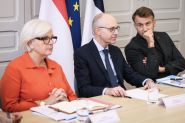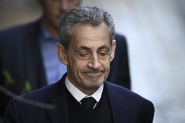- Home
- Middle East
- Barnier Promises Compromise in New French Government
French Prime Minister Michel Barnier promised cohesion and a willingness to compromise Sunday, a day after his new government was announced to immediate threats of a no-confidence motion in parliament.
Barnier, who heads up a government condemned by its critics as too far to the right, promised in a television interview to move fast to tackle the country's most pressing problems.
Under intense pressure to fix France's fragile financial position, he said a "national effort" would be required.
High earners would have to "do their bit" to help, he said, but there would be no income-tax increases for "people with low incomes, or wage earners, or the middle-income class".
The long wait for the new government -- 11 weeks after a snap election called by President Emmanuel Macron -- ended Saturday when the new team was announced. It marks a clear shift to the right.
Its left-wing opponents say they will challenge Barnier's government with a no-confidence motion as early as next month. Far-right politicians also criticised the composition of the new government.
In the July election, a left-wing alliance called the New Popular Front won the most parliamentary seats of any political bloc, but not enough for an overall majority.
Veteran far-right leader Marine Le Pen's National Rally emerged as the single largest party in the National Assembly.
Macron argued that the left was unable to muster enough support to form a government that would not immediately be brought down in parliament.
He also rejected a National Rally candidate because of the party's extremist legacy.
He turned instead to conservative veteran Barnier to lead a government drawing on parliamentary support mostly from Macron's allies.
Some conservative Republicans and centrist groups have also joined the administration.
In a TV appearance Sunday evening, Barnier called for "the greatest possible cohesion" within the government, and for a willingness to find "compromise".
Macron had been counting on a neutral stance from the far right, but National Rally leader Jordan Bardella said the new government had "no future whatsoever".
While Macron's allies had to relinquish some key ministries, they still got 12 portfolios out of the total 39.
With AFP
Barnier, who heads up a government condemned by its critics as too far to the right, promised in a television interview to move fast to tackle the country's most pressing problems.
Under intense pressure to fix France's fragile financial position, he said a "national effort" would be required.
High earners would have to "do their bit" to help, he said, but there would be no income-tax increases for "people with low incomes, or wage earners, or the middle-income class".
The long wait for the new government -- 11 weeks after a snap election called by President Emmanuel Macron -- ended Saturday when the new team was announced. It marks a clear shift to the right.
Its left-wing opponents say they will challenge Barnier's government with a no-confidence motion as early as next month. Far-right politicians also criticised the composition of the new government.
In the July election, a left-wing alliance called the New Popular Front won the most parliamentary seats of any political bloc, but not enough for an overall majority.
Veteran far-right leader Marine Le Pen's National Rally emerged as the single largest party in the National Assembly.
Macron argued that the left was unable to muster enough support to form a government that would not immediately be brought down in parliament.
He also rejected a National Rally candidate because of the party's extremist legacy.
'Greatest possible cohesion'
He turned instead to conservative veteran Barnier to lead a government drawing on parliamentary support mostly from Macron's allies.
Some conservative Republicans and centrist groups have also joined the administration.
In a TV appearance Sunday evening, Barnier called for "the greatest possible cohesion" within the government, and for a willingness to find "compromise".
Macron had been counting on a neutral stance from the far right, but National Rally leader Jordan Bardella said the new government had "no future whatsoever".
While Macron's allies had to relinquish some key ministries, they still got 12 portfolios out of the total 39.
With AFP
Read more



Comments